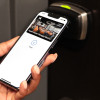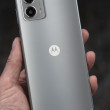Hands On with Bluetooth Door Locks
Jan 9, 2014, 5:11 PM by Rich Brome @richbrome
updated Jan 10, 2014, 4:56 PM

A new wave of residential door locks are hitting the market that use Bluetooth 4.0 LE (Low Energy) to turn your phone into your front door key. We take a look at the two big names in Bluetooth locks, in this hands-on from CES.
Not that long ago, it looked like NFC was going to be the game-changing technology that let your phone replace your wallet and keys. But Apple held out on NFC, and Bluetooth evolved. Now Apple has seemingly gone all-in on Bluetooth 4.0, offering broad support for the technology far ahead of Google and Android. It doesn't that help that Google Wallet and ISIS have had trouble gaining any traction. Now with the launch of iBeacons and the extensive functionality offered by Bluetooth 4.0 Low Energy, it seems like NFC is out and Bluetooth is in, for both payments and locks.
Bluetooth locks are here, and they offer great functionality. The main selling point - aside from carrying one less thing in your pocket - is the ability to manage infinite virtual "e-keys". In just a few seconds with the app on your iPhone, you can send an e-key to a friend, family member, or guest, and you can disable that e-key at any time.
Naturally, there's plenty of encryption to make this secure. Actually, it's more secure than a key. If you lose a physical key, you have to change your lock. If you lose a phone with an e-key, you can just disable it.
You can also set schedules for keys. For example, you could set your cleaning lady's e-key to work only on Thursday mornings, and your contractor's e-key to work only for the next five weeks while he finishes the kitchen renovation.
These locks know when you're at the door by sensing your phone via Bluetooth. The whole idea behind Bluetooth LE is that it uses so little power that you can leave it on constantly without draining your battery noticeably. The locks also have an antenna on each side, so they know which side of the door you're on.
We took a look at two Bluetooth locks: The Kevo from Kwikset, and the Goji smart lock. Kwikset is the more established name in locks, and the Kevo is the Bluetooth lock you can buy today. Goji is a startup, and their lock is much more ambitious.
The Kevo delivers all of the standard functionality described above, and costs about $220. To operate it, you simply walk up to the door and touch the lock. That's it. The lock instantly senses your phone, authenticates your e-key over Bluetooth, and unlocks the door. Ditto to lock the door on your way out.
The app connects to the cloud, but the lock does not, so if you make changes such as issuing new e-keys or disabling old ones, the lock won't be updated with that info until a phone comes near it. But that's all you have to do; every time a phone with the Kevo app is near the lock, it automatically syncs and updates any changes.
Goji is similar, but it does much more. It has a display, camera, and proximity sensor, plus it connects to your home Wi-Fi network. That means the lock does connect to the cloud, so it can be updated at any time, remotely.
Unlike the Kevo, you don't need to touch the Goji; it simply unlocks itself as you walk up to your door. You can configure whether it auto-locks when you leave the house. A hands-free lock is a neat idea, although there could be some situations where it locks or unlocks when you don't want it to. Those in dense urban areas or with certain house layouts might want to think carefully about how that could work before investing the Goji.
Where the Goji really stands out, though, is when a guest or delivery person approaches the door. The Goji proximity sensor detects the person at your door, and when it doesn't sense an e-key over Bluetooth, it snaps a photo and sends it directly to your phone. Then you can remotely unlock the door if it's someone you want to let in. It's pretty slick.
The Goji people told us varying things about availability. It might be available in one month from Staples. But if you try to order one directly from Goji today, they state it won't ship until March. It costs about $300, or $278 if you pre-order one now.
The next step for this technology is with hotels. Imagine a Hilton app that automatically turns your phone into your room key the moment your reserved room is available, and disables itself when you tap "check out" on your phone. The check-in desk will be obsolete. The company behind Kevo's electronics is bringing that exact technology to market in 2014. Neat.
Comments
You're SOL if you actually lose your phone.
(continues)
Personally, I'm in the habit of tapping my pockets to make sure I have my phone and wallet every time I stand up or walk through any door. I'm much more likely to leave my keys somewhere than my phone...
(continues)
Battery life
Performance in low-temperatures
Useless
I can't imagine all the money and time invested for this just to have a common burglar to get to your house and break in using a simple crowbar.
The point is that it's more convenient for you. Read the article. There are a lot of handy features that could make life easie...
(continues)


























 iPhone 14 Plus Offers a Big Screen For Less
iPhone 14 Plus Offers a Big Screen For Less
 Hands On with Xplora Kids Smartwatches
Hands On with Xplora Kids Smartwatches
 TCL's Newest Concept Phone has a Matte Screen
TCL's Newest Concept Phone has a Matte Screen
 Hyatt Launches Apple Wallet Room Keys
Hyatt Launches Apple Wallet Room Keys
 Qualcomm Intros Snapdragon Chips for 2023's Mid-Range & Affordable 5G Phones
Qualcomm Intros Snapdragon Chips for 2023's Mid-Range & Affordable 5G Phones


